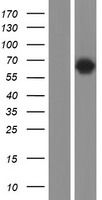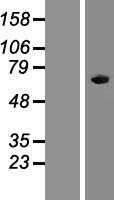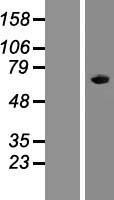order histories, retained contact details for faster checkout, review submissions, and special promotions.
Forgot password?
order histories, retained contact details for faster checkout, review submissions, and special promotions.
Location
Corporate Headquarters
Vector Laboratories, Inc.
6737 Mowry Ave
Newark, CA 94560
United States
Telephone Numbers
Customer Service: (800) 227-6666 / (650) 697-3600
Contact Us
Additional Contact Details
order histories, retained contact details for faster checkout, review submissions, and special promotions.
Forgot password?
order histories, retained contact details for faster checkout, review submissions, and special promotions.
A1CF / ACF
APOBEC1 complementation factor
Mammalian apolipoprotein B mRNA undergoes site-specific C to U deamination, which is mediated by a multi-component enzyme complex containing a minimal core composed of APOBEC-1 and a complementation factor encoded by this gene. The gene product has three non-identical RNA recognition motifs and belongs to the hnRNP R family of RNA-binding proteins. It has been proposed that this complementation factor functions as an RNA-binding subunit and docks APOBEC-1 to deaminate the upstream cytidine. Studies suggest that the protein may also be involved in other RNA editing or RNA processing events. Several transcript variants encoding a few different isoforms have been found for this gene.
| Gene Name: | APOBEC1 complementation factor |
| Synonyms: | A1CF, ACF65, ACF64, APOBEC-1 stimulating protein, APOBEC1 complementation factor, APOBEC1CF, ACF, Apo-B RNA editing protein, APOBEC1-stimulating protein, RP11-564C4.2, ASP |
| Target Sequences: | NM_014576 NP_055391.2 Q9NQ94 |









If you do not find the reagent or information you require, please contact Customer.Support@LSBio.com to inquire about additional products in development.










